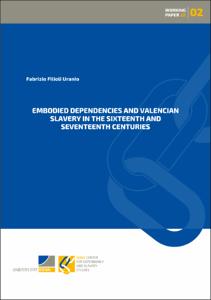Filioli Uranio, Fabrizio: Embodied Dependencies and Valencian Slavery in the Sixteenth and Seventeenth Centuries. Bonn: Bonn Center for Dependency and Slavery Studies, 2022. In: BCDSS Working Papers, 02.
Online-Ausgabe in bonndoc: https://doi.org/10.48565/bonndoc-62
Online-Ausgabe in bonndoc: https://doi.org/10.48565/bonndoc-62
@techreport{handle:20.500.11811/10399,
doi: https://doi.org/10.48565/bonndoc-62,
author = {{Fabrizio Filioli Uranio}},
title = {Embodied Dependencies and Valencian Slavery in the Sixteenth and Seventeenth Centuries},
publisher = {Bonn Center for Dependency and Slavery Studies},
year = 2022,
month = mar,
series = {BCDSS Working Papers},
volume = 02,
note = {The aim of this article is to investigate slavery in the Kingdom of Valencia in the sixteenth and seventeenth centuries. As we will see, slavery can be analysed in a perspective of both global history and micro-history, that is, the way the Valencian institutions played a precise role in the social control of slavery and in determining the price of slaves. Looking at some personal trajectories of these slaves will allow us to get closer to the Valencian reality of the Early Modern Period, showing us how the very concept of identification of these subjects, by means of brands and tattoos, was particularly important for local institutions precisely to recognize the slaves and possibly runaway slaves. In fact, one of the major concerns of the Valencian authorities was to avoid vagrancy phenomena, which could lead to petty criminal activities. Finally, those institutional mechanisms will also be highlighted by means of which slaves, without running away, could legally reach the much-desired freedom.},
url = {https://hdl.handle.net/20.500.11811/10399}
}
doi: https://doi.org/10.48565/bonndoc-62,
author = {{Fabrizio Filioli Uranio}},
title = {Embodied Dependencies and Valencian Slavery in the Sixteenth and Seventeenth Centuries},
publisher = {Bonn Center for Dependency and Slavery Studies},
year = 2022,
month = mar,
series = {BCDSS Working Papers},
volume = 02,
note = {The aim of this article is to investigate slavery in the Kingdom of Valencia in the sixteenth and seventeenth centuries. As we will see, slavery can be analysed in a perspective of both global history and micro-history, that is, the way the Valencian institutions played a precise role in the social control of slavery and in determining the price of slaves. Looking at some personal trajectories of these slaves will allow us to get closer to the Valencian reality of the Early Modern Period, showing us how the very concept of identification of these subjects, by means of brands and tattoos, was particularly important for local institutions precisely to recognize the slaves and possibly runaway slaves. In fact, one of the major concerns of the Valencian authorities was to avoid vagrancy phenomena, which could lead to petty criminal activities. Finally, those institutional mechanisms will also be highlighted by means of which slaves, without running away, could legally reach the much-desired freedom.},
url = {https://hdl.handle.net/20.500.11811/10399}
}






